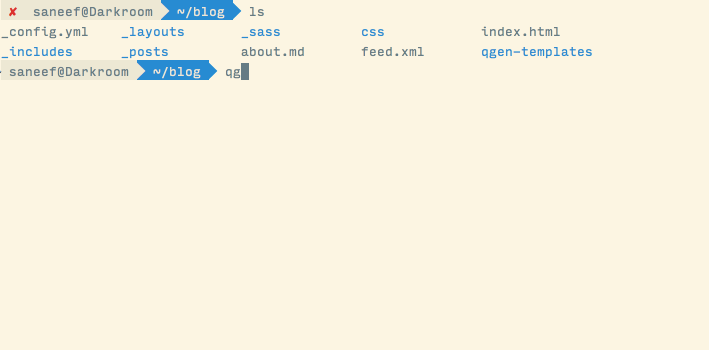qgen generates files and folders from templates.
Some scenarios where qgen may come handy for you:
- Generate a Jekyll blog post file from a template.
- Generate files for a new React component from preset files.

qgen is inspired by envato-tuts+’s Structurer.app.
Install
$ npm install -g qgen
Usage
Usage $ qgen <template name> [dest] [arguments] [options] Options --directory=<dir> Templates directory # Default: ./gqen-templates --config=<path> Path to the JSON config file # Default: ./qgen.json --force Overwrite the destination files --preview Preview the results without making any changes on files Examples $ qgen post # generates the post template in the current folder $ qgen post ./pages # generates the post template inside ./pages $ qgen post ./pages --page-title "Hello World" # generates the post template in inside ./pages with data field pageTitle="Hello World" to the template rendering engine In your project folder (where packages.json is present), keep your templates files inside qgen-templates.
Templates
qgen uses Handlebars to render the template files.
The data arguments passed to CLI will be made available inside Handlebars templates as camel case context variables. Eg --page-title can be accessed in the template as pageTitle.
Example
Template with a single file
File ./qgen-templates/post.md
---title: {{title}}slug: {{slug}}--- $ qgen post.md ./page --title "Hello World" --slug "hello-world"Generated file ./page/post.md
---title: Hello Worldslug: hello-world--- Template with multiple files
Keep all the files inside ./qgen-templates/my-component, where my-component will be the name of the template.
File ./qgen-templates/{{title}}.jsx
import React PropTypes from 'react'; const title = <div>title</div>; title; File ./qgen-templates/{{title}}.css
} $ qgen my-component ./Dummy --title "Dummy" --class-name "dummy"Generated file ./Dummy/Dummy.jsx
import React PropTypes from 'react'; const Dummy = <div>Dummy</div>; ; Generated file ./Dummy/Dummy.css
Templating filenames
You can use Handlebars templates to generate the filenames too.
Example: {{pageTitle}}.md file will be renamed to today.md, if you pass argument --page-title today while using qgen.
Note: Templates for filenames can only be used for files kept inside a folder. Read more on it under Template with multiple files.
‘qgen.json’, The configfile
You can use qgen.json to set options like, template directory, default destination, default argument values, etc.
"directory": "./my-templates" // Default: "./qgen-templates" "dest": "./pages" // Destination for all templates. Default: "./" "helpers": "./handlebar-helpers.js" // Path to the Handlebars helpers. Default: undefined "templates": // Default: {} "blog.md": // These configuration will be passed while compiling template 'blog.md' "title": "A Fresh Title" "slug": "a-fresh-title" "dest": "./blog-pages" // Overrides the 'dest' for this template. Default: undefined Using Handlebars Custom Helpers
You can load custom Handlebars helpers to qgen’s rendering engine. Pass the path to the file which exports the helper functions to the option helpers, either through the CLI param or, through config file. Here is a sample file which exports two custom helpers.
Tips & Tricks
Want to set a variable to today’s date?
Make use of the system date shell command.
$ qgen blog.md --filename=`date "+%Y-%m-%d"`License
MIT © Saneef Ansari
